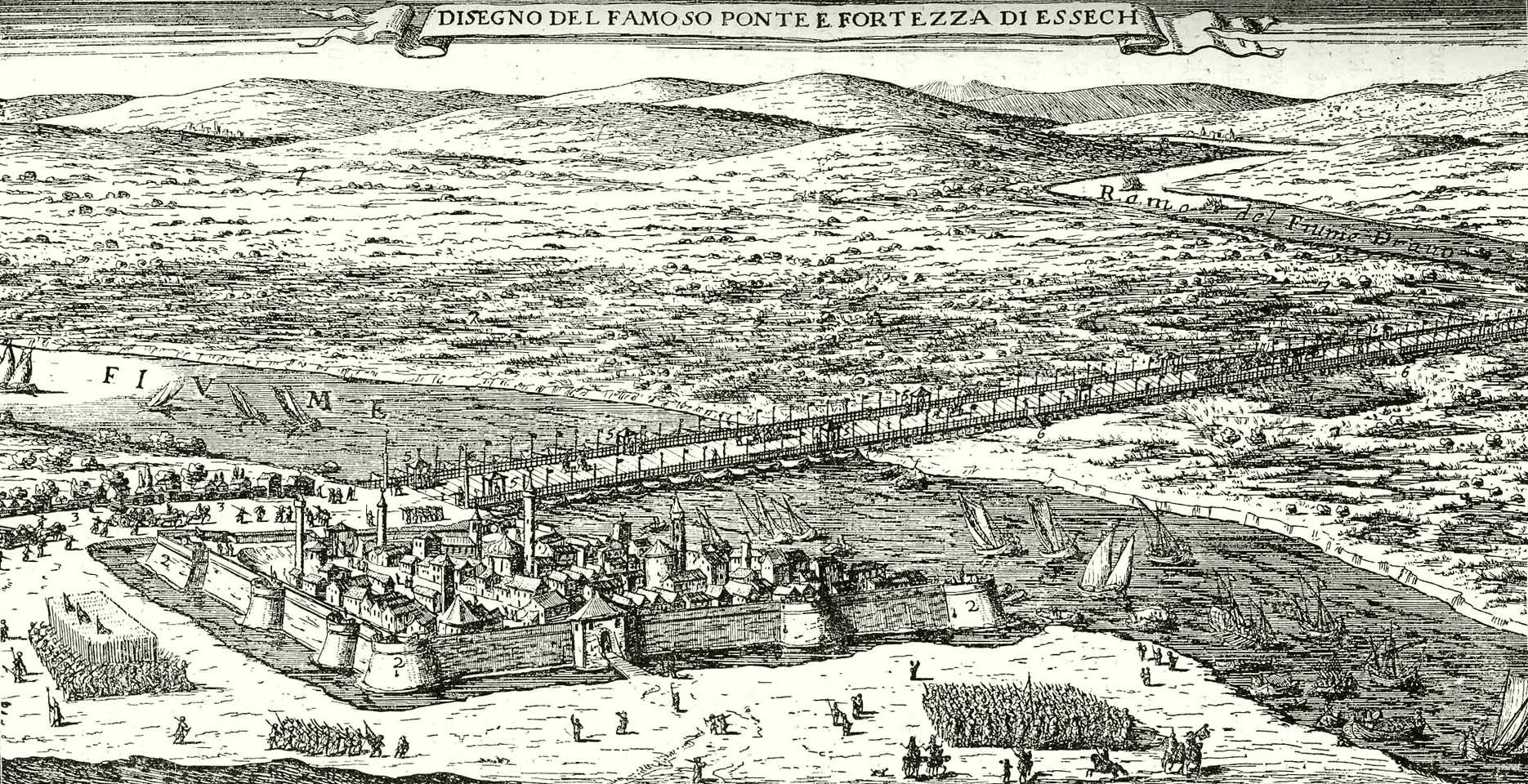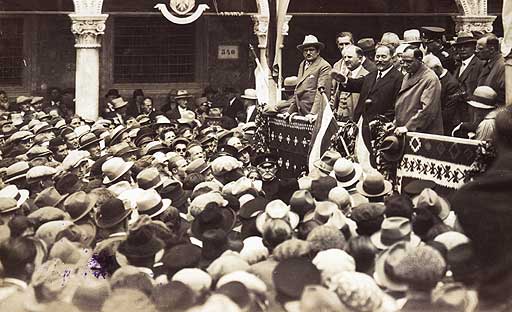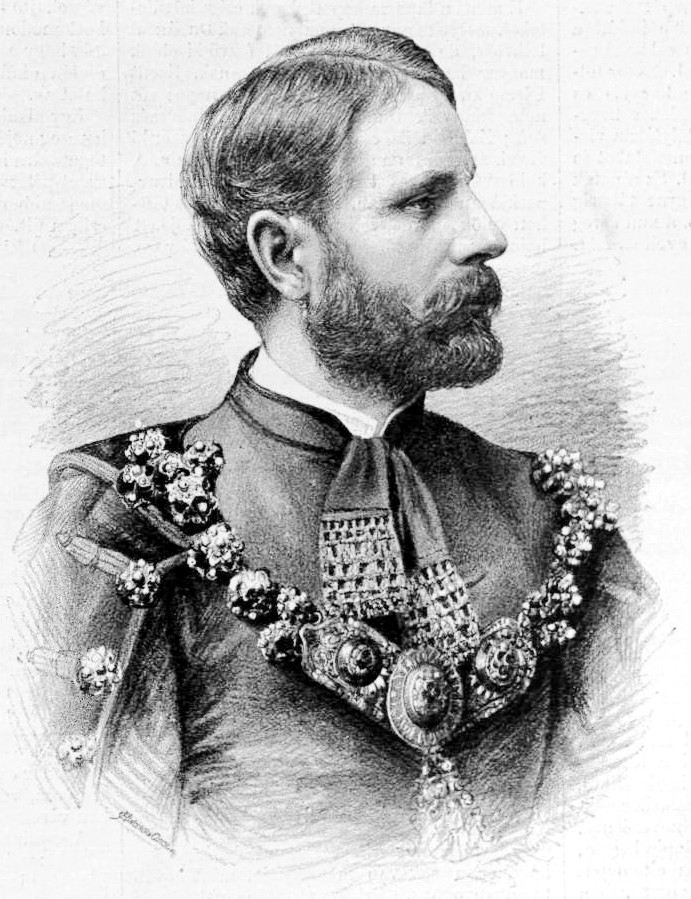|
Antun Radić
Antun Radić (Martinska Ves, Sisak-Moslavina County, Desno Trebarjevo, 11 June 1868 – Zagreb, 10 February 1919) was a Croats, Croatian scientist, writer, translator, journalist, sociologist, ethnographer and politician. He is the founder of Croatian ethnography. Biography Early life and education Antun Radić was born in Desno Trebarjevo, Martinska Ves, Sisak-Moslavina County, Martinska Ves near Sisak in the Kingdom of Croatia-Slavonia within Austria-Hungary as the eighth of eleven children in the family of poor peasants, Ana (née Posilović) and Imbra Radić. His younger brother, born as the ninth child, was Croatian politician Stjepan Radić. After finishing elementary school in Martinska Ves, Radić went to Zagreb where he continued his education in the elite Upper Town Gymnasium, after which he enrolled in the study of Slavic Studies and Classical Philology at the Universities in Zagreb and Vienna. He received his PhD from the University of Zagreb in 1892 with the the ... [...More Info...] [...Related Items...] OR: [Wikipedia] [Google] [Baidu] |
Martinska Ves, Sisak-Moslavina County
Martinska Ves is village and a municipality in Croatia in the Sisak-Moslavina County. It has a population of 3,488 (2011 census), 98% which are Croats. The settlements in the municipality are: * Bok Palanječki, population 138 * Desni Dubrovčak, pop. 115 * Desno Trebarjevo, pop. 334 * Desno Željezno, pop. 170 * Jezero Posavsko, pop. 70 * Lijeva Luka, pop. 233 * Lijevo Trebarjevo, pop. 59 * Lijevo Željezno, pop. 9 * Ljubljanica, pop. 31 * Mahovo, pop. 269 * Martinska Ves, pop. 683 * Setuš, pop. 157 * Strelečko, pop. 537 * Tišina Erdedska, pop. 305 * Tišina Kaptolska, pop. 259 * Zirčica, pop. 119 History In the late 19th and early 20th century, Martinska Ves was part of the Zagreb County of the Kingdom of Croatia-Slavonia. Notable people * Mihalj Šilobod Bolšić (1724–1787), Roman Catholic Roman or Romans most often refers to: *Rome, the capital city of Italy * Ancient Rome, Roman civilization from 8th century BC to 5th century AD * Roman people, the people of an ... [...More Info...] [...Related Items...] OR: [Wikipedia] [Google] [Baidu] |
Osijek
Osijek () is the fourth-largest city in Croatia, with a population of 96,848 in 2021. It is the largest city and the economic and cultural centre of the eastern Croatian region of Slavonia, as well as the administrative centre of Osijek-Baranja County. Osijek is located on the right bank of the Drava River, upstream of its confluence with the Danube, at an elevation of . Name The name was given to the city due to its position on elevated ground, which prevented the city being flooded by the local swamp waters. Its name "Osijek" derives from the Croatian word ''oseka'', which means "ebb tide". Due to its history within the Habsburg monarchy and briefly in the Ottoman Empire, as well as the presence of German, Hungarian, and Serbian minorities throughout its history, Osijek has (or had) its names in other languages, Осек/Osek or Осијек/Osijek in Serbian, Hungarian: ''Eszék'', german: link=no, Esseg or Essegg, tr, Ösek, la, Essek. It is also spelled ''Esgek''. Its ... [...More Info...] [...Related Items...] OR: [Wikipedia] [Google] [Baidu] |
Order Of Danica Hrvatska
The Order of Danica Hrvatska ( hr, Red Danice hrvatske; lit. "Order of the Croatian Morning Star") is the fourteenth most important medal given by the Republic of Croatia. The order was founded on 1 April 1995. The medal is awarded for different purposes and with different faces: * Marko Marulić – for culture * Blaž Lorković – for business/economics * Ruđer Bošković – for sciences * Nikola Tesla – for innovation * Franjo Bučar – for sports * Katarina Zrinska – for health, social welfare and the promotion of moral values * Antun Radić – for education (left: Order medal; middle: smaller decorative version; right: Order ribbon) image:Order of DH Marko Marulić.jpg, image:Order of DH Blaž Lorković.jpg, image:Order of DH Ruđer Bošković.jpg, image:Order of DH Nikola Tesla.jpg, image:Order of DH Franjo Bučar.jpg, image:Order of DH Katarina Zrinska.jpg, image:Order of DH Antun Radić.jpg, Notable recipients * John Malkovich * Mate Rimac * Michae ... [...More Info...] [...Related Items...] OR: [Wikipedia] [Google] [Baidu] |
Leo Tolstoy
Count Lev Nikolayevich TolstoyTolstoy pronounced his first name as , which corresponds to the romanization ''Lyov''. () (; russian: link=no, Лев Николаевич Толстой,In Tolstoy's day, his name was written as in pre-reformed Russian. ; ), usually referred to in English as Leo Tolstoy, was a Russian writer who is regarded as one of the greatest authors of all time. He received nominations for the Nobel Prize in Literature every year from 1902 to 1906 and for the Nobel Peace Prize in 1901, 1902, and 1909; the fact that he never won is a major controversy. Born to an aristocratic Russian family in 1828, Tolstoy's notable works include the novels ''War and Peace'' (1869) and ''Anna Karenina'' (1878), often cited as pinnacles of realist fiction. He first achieved literary acclaim in his twenties with his semi-autobiographical trilogy, ''Childhood'', '' Boyhood'', and ''Youth'' (1852–1856), and '' Sevastopol Sketches'' (1855), based upon his experiences in ... [...More Info...] [...Related Items...] OR: [Wikipedia] [Google] [Baidu] |
Nikolai Gogol
Nikolai Vasilyevich Gogol; uk, link=no, Мико́ла Васи́льович Го́голь, translit=Mykola Vasyliovych Hohol; (russian: Яновский; uk, Яновський, translit=Yanovskyi) ( – ) was a Russian novelist, short story writer and playwright of Ukrainian origin. Gogol was one of the first to use the technique of the grotesque, in works such as " The Nose", " Viy", "The Overcoat", and "Nevsky Prospekt". These stories, and others such as " Diary of a Madman", have also been noted for their proto-surrealist qualities. According to Viktor Shklovsky, Gogol's strange style of writing resembles the "ostranenie" technique of defamiliarization. His early works, such as ''Evenings on a Farm Near Dikanka'', were influenced by his Ukrainian upbringing, Ukrainian culture and folklore. His later writing satirised political corruption in the Russian Empire (''The Government Inspector'', '' Dead Souls''). The novel ''Taras Bulba'' (1835), the play ''Marriage ... [...More Info...] [...Related Items...] OR: [Wikipedia] [Google] [Baidu] |
Alexander Pushkin
Alexander Sergeyevich Pushkin (; rus, links=no, Александр Сергеевич ПушкинIn pre-Revolutionary script, his name was written ., r=Aleksandr Sergeyevich Pushkin, p=ɐlʲɪkˈsandr sʲɪrˈɡʲe(j)ɪvʲɪtɕ ˈpuʂkʲɪn, a=ru-Pushkin.ogg; ) was a Russian poet, playwright, and novelist of the Romantic era.Basker, Michael. Pushkin and Romanticism. In Ferber, Michael, ed., ''A Companion to European Romanticism''. Oxford: Blackwell, 2005. He is considered by many to be the greatest Russian poetShort biography from University of Virginia . Retrieved 24 November 2006.Allan Rei ... [...More Info...] [...Related Items...] OR: [Wikipedia] [Google] [Baidu] |
1913 Croatian Parliamentary Election
Parliamentary elections were held in the Kingdom of Croatia-Slavonia on 16 and 17 December 1913. There were 209,618 eligible male voters. According to the census of December 31, 1910, the Kingdom of Croatia-Slavonia had a population of 2,621,954. The Croatian parliament had been dissolved by ban Slavko Cuvaj on 27 January 1912. On April 4 Cuvaj suspended the constitution and the following day was proclaimed commissioner of the Kingdom. Over the course of the following year two assassination attempts were made on Cuvaj, leading to his withdrawal as commissioner. Ivan Skerlecz was proclaimed ban on November 27, 1913 and called elections for 16 and 17 December. Results Elected representatives Sources * Branko Dubravica: ''Parlamentarni izbori u Hrvatskoj i Velikoj Gorici (1848.-1938.)''; Albatros, Velika Gorica 2004, pp. 189–190, {{Elections in Austria-Hungary Elections in Croatia 1913 elections in Europe, Croatia 1913 in Croatia Elections in Austria-Hungary Decembe ... [...More Info...] [...Related Items...] OR: [Wikipedia] [Google] [Baidu] |
1911 Croatian Parliamentary Election
Parliamentary elections were held in Kingdom of Croatia-Slavonia, Croatia-Slavonia in December 1911."The Ban Of Croatia And The Elections", ''The Times'', 16 December 1911 Despite efforts of Ban Nikola Tomašić to coerce voters to vote for pro-government parties, the result was unfavourable as the government won only 21 seats."The Elections In Croatia", ''The Times'', 20 December 2011 Elections in 4 districts were suspended and in 1 district the results were challenged. On the last day of the elections Josip Frank, former leader of the Starčević's Party of Rights, died in Zagreb.Josip Horvat: Politička povijest Hrvatske, 1936, p. 412 Results References {{Croatian elections 1911 elections in Europe, Croatia 1911 in Croatia Elections in Croatia Elections in Austria-Hungary December 1911 events Kingdom of Croatia-Slavonia Election and referendum articles with incomplete results ... [...More Info...] [...Related Items...] OR: [Wikipedia] [Google] [Baidu] |
1910 Croatian Parliamentary Election
Parliamentary elections were held in the Kingdom of Croatia-Slavonia on 28 October 1910 to elect the members of the Sabor. The elections were called by ban Nikola Tomašić after the adoption of a new Law of the Electoral Order. Results Elected representatives Croatian Peoples' Peasant Party *Vinko Lovreković Party of Rights *Franjo Hrustić Notes References *Ivo Perić, ''Hrvatski državni sabor 1848.-2000.'' 2nd volume. Dom i svijet. Zagreb, 2000. (pg. 372) {{Croatian elections Elections in Croatia Croatia , image_flag = Flag of Croatia.svg , image_coat = Coat of arms of Croatia.svg , anthem = "Lijepa naša domovino"("Our Beautiful Homeland") , image_map = , map_caption = , capit ... 1910 in Croatia Elections in Austria-Hungary October 1910 events Kingdom of Croatia-Slavonia Election and referendum articles with incomplete results ... [...More Info...] [...Related Items...] OR: [Wikipedia] [Google] [Baidu] |
Croatian Peoples' Peasant Party
The Croatian Peasant Party ( hr, Hrvatska seljačka stranka, HSS) is an agrarian political party in Croatia founded on 22 December 1904 by Antun and Stjepan Radić as Croatian Peoples' Peasant Party (HPSS). The Brothers Radić believed that the realization of Croatian statehood was possible within Austria-Hungary, but that it had to be reformed as a Monarchy divided into three equal parts – Austria, Hungary, Croatia. After the creation of Kingdom of Yugoslavia in 1918, Party requested for the Croatian part of the Kingdom to be based on self-determination. This brought them great public support which culminated in 1920 parliamentary election when HPSS won all 58 seats assigned to Croatia. In 1920, disgruntled with a bad position of Croats in the Kingdom, the party changed its name into Croatian Republican Peasant Party (HRSS) and started advocating secession from the Kingdom and the establishment of ''"peaceful peasant Republic of Croatia"''. On 1923 and 1925 election, HRSS ... [...More Info...] [...Related Items...] OR: [Wikipedia] [Google] [Baidu] |
Károly Khuen-Héderváry
Count Károly Khuen-Héderváry de Hédervár, born as ''Károly Khuen de Belás'' ( hr, Dragutin Khuen-Héderváry, 23 May 1849 – 16 February 1918) was a Hungarian politician and the Ban of the Kingdom of Croatia-Slavonia in the late nineteenth century. Khuen's reign was marked by a strong magyarization. After a series of riots broke out against him in 1903, Khuen was relieved of his duty and appointed prime minister of Hungary. Background Born in Bad Gräfenberg, Austrian Silesia, Károly Khuen de Belás was the oldest son of seven siblings born to Hungarian magnate Antal Khuen de Belás (1817–1886) and his wife, Baroness Angelika Izdenczi de Monostor et Komlós (1823–1894). * Alice (1850–1879), wife of Count Zsigmond Zichy de Zich et Vásonykeö, an Imperial and Royal Chamberlain, Lieutenant, they married 8 January 1877 * Antal (1852–1890), Imperial and Royal Chamberlain, member of the Sabor, prominent architect * Angelika (1855–1918), wife of Count Albert v ... [...More Info...] [...Related Items...] OR: [Wikipedia] [Google] [Baidu] |
1897 Croatian Parliamentary Election
Parliamentary elections were held in the Kingdom of Croatia-Slavonia from 19 to 22 May 1897. The People's Party emerged as the victor. Background The 1897 elections were held during the autocratic rule of Croatian ban Károly Khuen-Héderváry. His primary task as the ban of Croatia was to preserve the Croatian-Hungarian union. Héderváry had maintained good relations with the Hungarian Liberal Party, while he relied on the People's Party in Croatia to maintain the status quo. Héderváry's supporters had won the parliament majority in each of the three previous elections held during his reign, in 1884, 1887 and 1892. At the time of the election, the People's Party held the parliamentary majority. Under the electoral law, only 2% of the nation's citizens could vote, i.e. men over thirty years old, who could pay 30 forints in tax. Furthermore, Héderváry had gerrymandered the districts to favour different ethnic groups and resorted to divide and rule policies, stoking antagonism ... [...More Info...] [...Related Items...] OR: [Wikipedia] [Google] [Baidu] |




.jpg)

